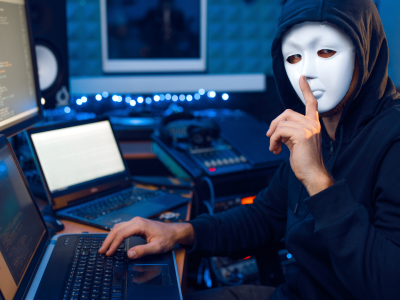Cyber-attacks are on the increase, is your laptop safe?
Halloween is spooky enough without any unwanted online jump scares! Our handy guide is full of treats to help keep you safe from cyber tricks!
Staying Safe
Your laptop is an essential part of your personal and professional life. Whether you’re sending emails, online shopping, managing your finances, or storing sensitive data, your laptop is your trusted device. But how much trust can you really place in it?
You need to stay connected, but with increased connectivity comes heightened risk. Cybers attacks targeting laptops are evolving, and so we’ve created these Top Ten Tips to help keep you safe online.
- Keep Your Operating System Up to Date
Update notifications are easy to ignore, but they are essential for security. Regularly updating your operating system is one of the simplest ways to protect your laptop. These updates often include vital security patches that fix vulnerabilities hackers might exploit.
Top Tip: Turn on automatic updates and install critical patches as soon as they're released!
- Install Reliable Antivirus Software
Antivirus software is your laptop's first line of defence against malware, spyware, and ransomware. If anything suspicious pops up, your software will block it before it causes trouble. Many antivirus programs also come with extras, including firewalls and phishing protection.
Top Tip: Choose a reputable antivirus solution and update it regularly, to ensure it recognises the latest threats.
- Use Strong, Unique Passwords and a Password Manager
It might seem as though using the same password for multiple accounts is making your life easier, but in reality, you’re making life easier for hackers. All your accounts should have a strong, unique password. This is especially important for accounts linked to banking, emails, and sensitive data. If this seems like a headache, then a password manager can help you create and store complex passwords, so that you don’t need to remember them all.
Top Tip: Use a mix of letters, numbers, and symbols, and enable two-factor authentication (2FA) for an extra layer of security.
- Watch Out for Phishing Scams
Phishing scams are sneaky, and they’re everywhere—dodgy emails, fake text messages, and even social media links. In fact, phishing is one of the most common ways hackers gain access to personal information. Scammers trick you into clicking malicious links or providing personal information, such as your passwords or credit card details. Always double-check the sender's email address and avoid clicking on suspicious links.
Still unsure about how to spot a phishing scam? Find out more by visiting: cyber.gov.au/resources
Top Tip: Use anti-phishing browser extensions, be wary of unsolicited emails, and trust your instincts. If something feels off, it probably is.
- Secure Your Wi-Fi and Use a VPN
Unsecured and public Wi-Fi networks might be convenient, but they are also a playground for hackers. If you're using a public network—anywhere from your favourite coffee shop to your local library—always use a virtual private network (VPN) to encrypt your internet traffic. This adds an extra layer of protection, ensuring that any data you transmit is hidden from snoopers.
To find out more about how to stay safe when you’re using your laptop on the move, visit: cyber.gov.au/resources-business-and-government
Top Tip: Always use a VPN when you're on a public network, and make sure your home Wi-Fi is secured with a strong password and encryption.
- Enable Disk Encryption
If your laptop is ever lost or stolen, encryption makes it harder for someone to access your files. It works by scrambling your data, so that even if someone has physical access to your laptop, they won’t be able to read the contents of your hard drive.
Top Tip: Turn on full disk encryption to protect your files, even if your laptop falls into the wrong hands.
- Back Up Your Data Regularly
No one likes to think about the worst-case scenario. However, it’s important to know what the dangers are. Cyberattacks like ransomware can lock you out of your own files until the ransom is paid. The good news is that if you have a recent backup, you can recover your data without giving in to a hacker’s demands. Regular backups to an external hard drive or a cloud service minimise the damage of cyberattacks and hardware failure.
Top Tip: Set up automatic backups to an external hard drive and a secure cloud storage solution for ultimate peace of mind.
- Think About Physical Security
Cybersecurity protects your data from virtual threats, but physical theft is another risk. If your laptop is stolen, there’s a danger that your personal information could be stolen too. If you’re working in a public place, always keep your laptop within sight, and consider using tracking software so that you can easily find your laptop if it is lost or stolen.
Top Tip: Use a laptop lock when you’re out and about, and invest in tracking software to locate your device if it’s lost or stolen.
- Turn Off Bluetooth and Unused Ports
Leaving your Bluetooth on all the time—especially in public places—invites unwanted connections to your laptop. This is because Bluetooth and other wireless connections can serve as entry points for hackers. By disabling unused ports and services that may provide access to your system, you limit the access points that hackers can exploit.
Top Tip: Only turn your Bluetooth on when you need it, and disable any services you’re not using to reduce vulnerabilities.
- Avoid Downloading Unverified Software
Downloading software from unofficial or unverified sources can be a big risk. Malware often hides in apps and programs from unverified sources. Even if an app seems legitimate, it’s wise to stick to official platforms, such as the Apple App Store or Microsoft Store, when downloading new software.
Top Tip: Download apps only from official sources, and regularly review the permissions granted to apps installed on your laptop.
Conclusion
Cybersecurity threats are growing more sophisticated. It might feel like a lot to think about, but once you’ve got a few good habits in place, it becomes second nature. By taking these proactive steps, you can significantly reduce the risk of falling victim to cyberattacks. From regularly updating your software to using strong passwords and being mindful of public Wi-Fi, there are plenty of simple steps you can take to keep your laptop and your personal data safe.
The digital world continues to evolve, but staying informed and following these basic principles will help you navigate it safely. Taking a few minutes to review your laptop’s security settings will minimise your risk of cyberattacks and maximise your peace of mind.


